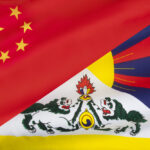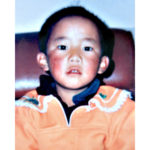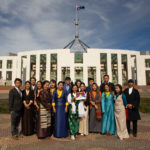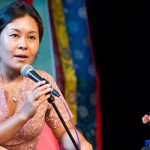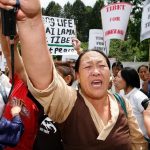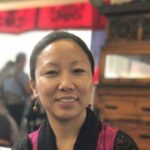Boycott Beijing’s Sportswashing: An Interview With Australia Tibet Council’s Dr Zoe Bedford
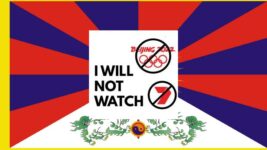
The Australia Tibet Council, and other human rights groups, staged a rally out the front of the Channel 7 studios in Sydney’s Martin Place last Friday. Those demonstrating were calling out the television network for its part in broadcasting the Beijing Winter Olympics in this country.
Since 2009, 157 Tibetans have self-immolated in their homelands to protest the oppressive rule that their people are subjected to under the Chinese Communist Party.
Last year, Freedom House ranked Tibet the least free country in the world alongside Syria.
Beijing began its invasion of Tibet in late 1949 and took full control of the then independent nation the following year. And ever since, the CCP has been carrying out a program of cultural genocide, in an attempt to erase Tibetan language, belief systems and ways of life.
In running its No Beijing 2022 campaign against the Winter Olympics in China, the ATC is calling the event out as a massive sportswashing exercise: a classic example of diverting attention from widespread human rights abuses, with the hosting of a prestigious sporting event.
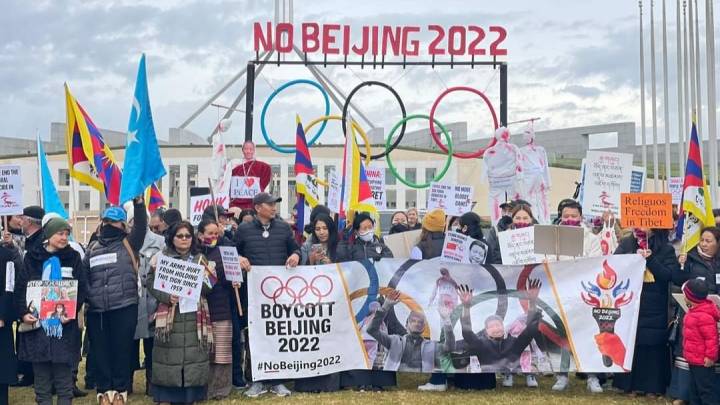
Colonial boarding schools
Whilst world cameras were focused on China for the 2008 Beijing Olympics, Tibetans rose up en masse to demonstrate against half a century of oppressive Chinese rule. These peaceful actions were met with brutal force and the Tibetan population has been paying for them ever since.
The Tibetan Action Institute was born out of the 2008 resistance. It has just released its Separated From Their Families, Hidden From the World report, which reveals that the CCP has rolled out a system of colonial boarding schools where 78 percent of Tibetan children have now been sent.
Whilst separated from their families and traditional way of life, Tibetan youths from 6 to 18 are forced to speak and learn in Mandarin, as they’re subjected to a “highly politicised curriculum intended to make them identify as Chinese”.
This is an aspect of colonialism that was employed by the British Empire and saw the mass removal of Indigenous children from their families in nations, like Canada and Australia, to be placed in English-speaking boarding schools, where traditional ways of life were suppressed.
No Beijing 2022
The Australia Tibet Council is now embarking on a new stage of its campaign against the Beijing Winter Olympics. I Will Not Watch is calling on the Australian public to boycott the Channel 7 coverage of the international sporting event.
While this week has seen Venerable Bagdro marching from Newcastle to Sydney in opposition to the Beijing Winter Olympics. The Tibetan Buddhist monk spent four years in a Chinese prison, after being detained in 1988 over protesting against Chinese religious repressions in his country.
Sydney Criminal Lawyers spoke to Australia Tibet Council executive officer Dr Zoë Bedford about the circumstances that warrant the charge of sportswashing, the implications of the colonial boarding school system, and the alternative viewing event her organisation has for Australians.
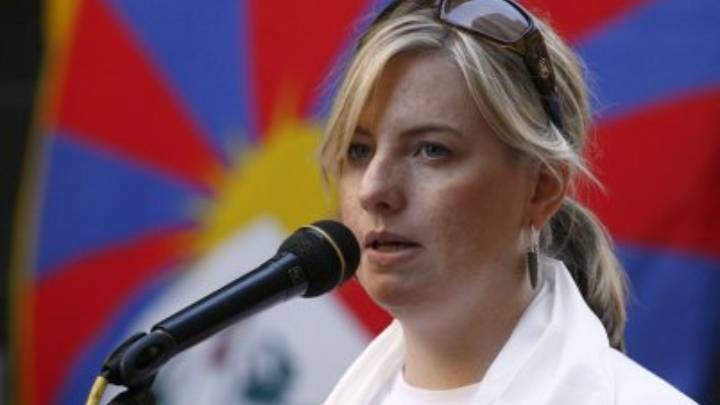
Last Friday, the Australia Tibet Council conducted a protest outside the Channel 7 studios in Martin Place. This was part of the No Beijing 2022 campaign, which is calling for a boycott of the Winter Olympic Games in China.
The Beijing Winter Olympics are set to take place over a two week period commencing on 4 February. Dr Bedford, why is ATC organising to boycott the event?
This is a massive propaganda exercise for China. They’ll use this opportunity to try and sportswash their terrible human rights record away.
ATC was instrumental in getting the diplomatic boycott from the Australian government last year. And we applaud them for taking a stand against China’s human rights record.
There are many elements to an Olympic Games. There is sponsorship, and there is broadcasting. And, of course, there’s the athletes themselves.
We’ve taken measures to say Channel 7 should consider how complicit they are with the Chinese government in their broadcasting of these games and spreading Beijing’s propaganda message.
That’s why we organised that campaign.
We’re also organising the I Will Not Watch campaign for the rest of the Olympics, explaining that this is going to be a massive sportswashing exercise and that the truth needs to be told.
That truth is that China is a human rights abuser. China is devastating the people of Tibet. The Uyghur people are facing a genocide. Hong Kong has effectively been destroyed, and it’s now an authoritarian state.
People need to know this. We can’t just smile this away with all the celebrations of the Chinese Winter Olympics.
So, people can join the I Will Not Watch campaign. They can make a personal pledge not to watch the Olympic Games.
They can sign up to our human rights film festival, which is an online event that has documentaries about Tibet, the Uyghurs and Hong Kong, as well as authoritarianism in China. So, people can sign up and watch those.
We’re offering these alternatives to watching the Olympic Games because I don’t want to be complicit in China’s propaganda exercise and a lot of Australians don’t want that either.
In 1959, the Tibetan Uprising against Chinese rule occurred, which was brutally suppressed. The Dalia Lama soon fled afterwards, with many Tibetans having followed him since.
Seventy years on, how would you describe life for the 6 million Tibetans continuing to live in their homelands under Chinese Communist Party rule?
I describe it as extremely oppressive, and I’m not the only one. Freedom House last year ranked Tibet as the world’s worst countries for human rights abuses, along with Syria: the most oppressed country in the world.
What we see on a daily basis for Tibetan people is almost like a complete lockdown. Since 2008, when Beijing had the summer Olympics, Tibet has essentially been under lockdown.
You need a special visa to travel to Tibet. It is not open to travel for diplomats and journalists. Australian parliamentarians have requested several times to go on an exploratory trip of Tibet to do factfinding and the Chinese government has refused to issue visas.
Tibetans themselves can’t travel around Tibet freely. For example, one of the sponsors of the Beijing Winter Olympics is Airbnb. Tibetan and Uyghur people are not able to book and stay in an Airbnb in China, because of the special visa arrangements. So, they’re excluded from that.
We’re also seeing terrible cases of human rights abuses of political prisoners. People have been arrested for what would be considered very small protests in Australia. They’re punished for sharing images of the Dalia Lama.
We saw a terrible case in 2020, where a 36-year-old mother-of-four died in prison because she had exchanged money with her own family who were living outside of China
The Tibetan woman sent some money to a family member living in India. She was arrested for doing that and died in custody. Her name was Lhamo.
So, we see these terrible instances again and again. China has been destroying monasteries and expelling nuns and monks from monasteries. They have been closing down Tibetan language schools.
So, it’s an incredibly oppressive environment. Tibetans are watched and monitored all the time. They have no freedom.
A recently released report has highlighted that 78 percent of Tibetan children living under Chinese rule have been placed in residential schools.
This has been likened to processes that have occurred in western settler colonial states. Can you speak on what this program entails?
There has always been a boarding school program in China. They’re all throughout the country. But, since 2008, we’ve seen an increase in these boarding schools in Tibetan regions.
So, there are more boarding schools, comparatively, in Tibetan regions than there are available for Han Chinese children in other parts of the country.
Previously, these schools were for high school aged students, but now we’ve seen an extension down to very young children, such as 5-year-olds.
This is destroying locally run primary schools for children. And they’re destroying any primary schools that are attached to monasteries. So, parents are left with little choice but to send their children to these CCP-run boarding schools.
This is detrimental because they’re separated from their families, their language and their culture.
In any CCP-run boarding school in China, you cannot practice a religion and you have to follow the CCP propaganda curriculum. There are some Tibetan language courses, but they’re simply a course in Tibetan language, while the rest of the instructions are in Mandarin.
The UN recommends that for the first five years of school, children should speak their mother tongue. So, Tibetan children should be speaking Tibetan to begin with, and then later on they can learn Mandarin.
But this is children from a very young age learning in Mandarin, except for the Tibetan language classes.
There is a parallel to other colonial countries, including Australia. Just as we have seen the devastating effects of the Stolen Generation, that is what we’re looking at for the future of Tibet: children separated from their parents at a young age and forced into a colonial education system.
Last month, it came to light that the CCP has torn down a 30-metre-high bronze Buddha statue near Drago county in Kardze Tibetan Autonomous Prefecture, which is a part of Tibet now incorporated into Sichuan Province.
The last half decade has also seen the destruction of many Tibetan homes at Larung Gar: the largest seat of Tibetan Buddhist learning.
The CCP targeted Tibetan culture early on in its takeover of the region. Are there concerns that there’s now a renewed campaign focusing on destroying the Tibetan way of life?
That is absolutely the concern. As you said, during the Cultural Revolution, there was a massive destruction of monasteries.
But we’ve seen a renewal of that over the last couple of years with the destruction of Larung Gar and other learning centres, like Yachen Gar. Then there’s the destruction of the Buddha statue that was built with CCP permission.
It’s very deliberate. In 2008, when there was an uprising, monks and nuns led the way, as they always have in Tibetan resistance.
Monks and nuns choose to be on the frontline because they don’t have children. They’re not putting family at risk by doing so.
So, this is a recognition from the CCP that they were not winning the hearts and minds of Tibetan people. They expected that the resistance movement would fade out over time in Tibet. But it certainly hasn’t.
They’ve seen many young people involved in the uprisings. And now we’re seeing the destruction of these religious centres, as they’re really trying to prevent Tibetan Buddhism from being so influential in the people’s way of life.
We have seen restrictions on lay people even carrying religious ornamentation. A parent cannot pick up a child from school if they’re wearing any form of religious ornamentation.
It’s become very oppressive in how they’re trying to restrict Tibetan Buddhism and its influence over people’s lives. And it’s an essential part of their culture.
Magnitsky laws passed both houses of federal parliament in early December. The ATC was a key campaigner in seeing such laws passed in this country. Why is that the case?
The Magnitsky laws are important because they provide individual sanctions.
Sanctioning countries can be hard, no matter how terrible their behaviour is. But under Magnitsky laws, certain individuals can be sanctioned by foreign governments if they have a terrible human rights record.
We believe it will be the best tool going forward in trying to get some of the worst human rights offenders in the CCP sanctioned in Australia.
This would mean they wouldn’t be able to have bank accounts in Australia. Their family wouldn’t be able to come to Australia to go to university. It’s a serious restriction.
Currently, there are really no other tools that Australia can use to push back against human rights abusers. They can express how upset they are, or they have the very blunt tool of a countrywide sanction.
Magnitsky is important as it allows Australia to try to change the situation in Tibet by sanctioning individuals and letting it be known, which will spread the message to others that if they engage in this behaviour, they will face sanctions too.
It is one of the best tools we have to bring about on-the-ground change for Tibetan people in limiting human rights abuses.
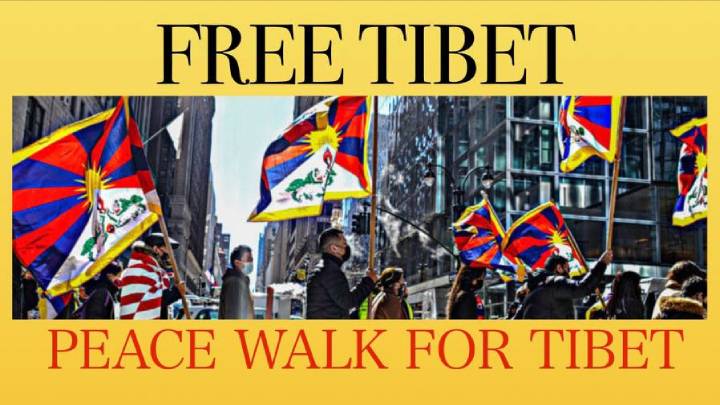
And lastly, Dr Bedford, Friday sees the commencement of the Beijing Winter Olympics. It will run through to the 20 February.
What will the Australia Tibet Council be doing to oppose it over this time?
As mentioned before, we’ve got the new part of our campaign I Will Not Watch, asking people to make a personal pledge not to watch the Olympics.
We’re going to be preparing people for the fact that there is going to be a propaganda onslaught coming from China.
We know in 2008 that China was pretty brazen about things. For example, in the opening ceremony, they had Chinese children dressed up like Tibetans singing songs about how happy they are to be in the country.
So, they’re not afraid to use mechanisms like that. And we want people to know the truth about what’s really happening in Tibet.
The I Will Not Watch campaign has the online film festival that people can watch to educate themselves, and to let Channel 7 know that they won’t be participating in this propaganda sportswashing exercise.


